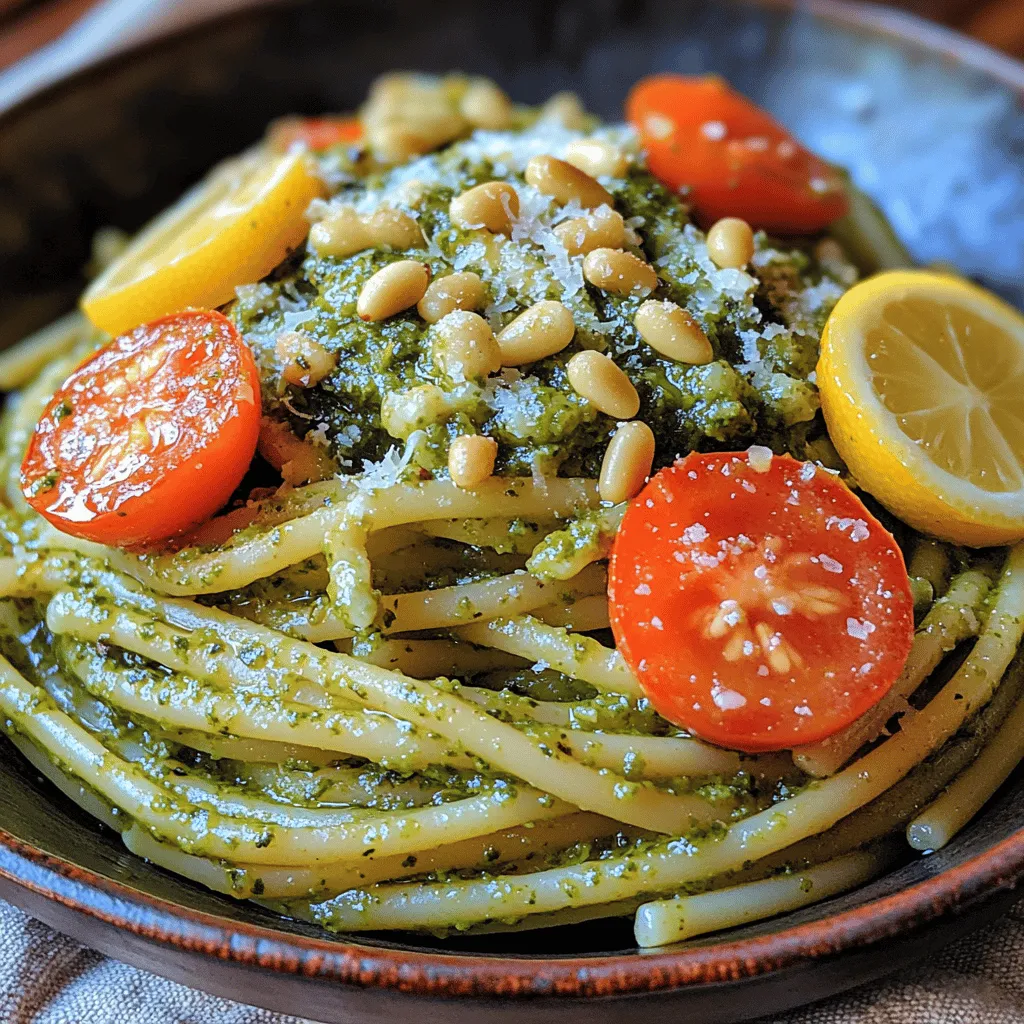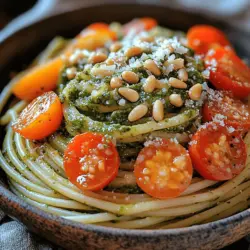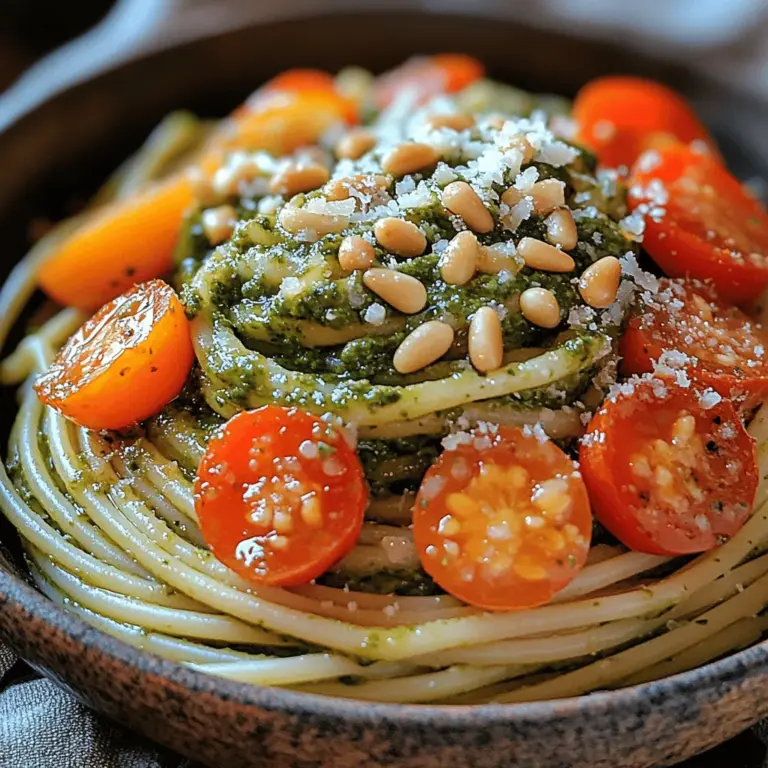Introduction
Lemon Basil Pesto Pasta is a delightful dish that perfectly encapsulates the essence of fresh, vibrant flavors. It combines the aromatic qualities of fresh basil with the zesty brightness of lemon, creating a refreshing twist on the traditional pesto pasta. This dish is not only a celebration of summer ingredients but also a versatile option that can be enjoyed for lunch, dinner, or even as a side dish for gatherings and special occasions. Whether you’re whipping it up for a casual family dinner or serving it at a festive gathering, Lemon Basil Pesto Pasta is sure to impress with its exquisite flavor profile and appealing presentation.
The appeal of this dish lies in its simplicity and the quality of the ingredients used. When you incorporate fresh basil, ripe lemons, and high-quality olive oil, you elevate an ordinary pasta dish into a gourmet experience. The combination of flavors in Lemon Basil Pesto Pasta creates a dish that feels indulgent yet is easy to prepare. With just a few steps, you can bring a taste of Italy to your kitchen that is both satisfying and refreshing.
Understanding the Ingredients
Fresh Basil
At the heart of Lemon Basil Pesto Pasta is fresh basil, a fragrant herb that is essential for creating the dish’s signature flavor. Basil brings a sweet, slightly peppery taste that is unmatched by dried herbs. When using fresh basil, it’s crucial to select vibrant green leaves that are free from blemishes. The aroma released during preparation is a clear indicator of its freshness. This ingredient not only enhances flavor but also offers numerous health benefits, including antioxidants and anti-inflammatory properties.
Pine Nuts
Pine nuts are another key ingredient in traditional pesto recipes and play a vital role in Lemon Basil Pesto Pasta. These small, buttery nuts add a rich, creamy texture that complements the other ingredients. Nutritionally, pine nuts are packed with healthy fats, protein, and vitamins, making them a great addition to your diet. Their subtle sweetness balances the sharpness of the lemon and the earthiness of the basil, creating a harmonious blend of flavors in the pesto.
Garlic
Garlic is a crucial component that enhances the overall flavor of the dish. Its pungent aroma and bold taste elevate the pesto, providing depth and complexity. Beyond its flavor, garlic is known for its numerous health benefits, including its ability to boost the immune system and reduce inflammation. When preparing the pesto, using fresh garlic cloves will yield the best results, ensuring that the flavor is bright and lively.
Parmesan Cheese
The quality of Parmesan cheese is significant in Lemon Basil Pesto Pasta. Aged Parmesan adds a nutty, savory depth to the pesto that is irreplaceable. When selecting Parmesan, opt for freshly grated cheese, as it melts beautifully and integrates seamlessly into the sauce. The richness from the cheese not only enhances the flavor but also contributes to the creamy texture that makes the pesto cling beautifully to the pasta.
Extra Virgin Olive Oil
Choosing the right extra virgin olive oil is essential for achieving the perfect pesto. This oil contributes both texture and flavor, and its quality can significantly impact the final dish. High-quality extra virgin olive oil should have a robust flavor profile—fruity, peppery, and slightly bitter. When preparing the pesto, the olive oil acts as a binding agent, helping to emulsify the ingredients and create a smooth, cohesive sauce. Drizzling a little extra on top before serving can also enhance the dish’s flavor.
Lemon
Lemon is a star ingredient in this recipe, providing acidity and brightness that balance the richness of the pesto. The zest and juice of the lemon brighten the entire dish, elevating the flavors and making them pop. The acidity cuts through the creaminess of the cheese and olive oil, ensuring that the dish remains refreshing rather than heavy. Freshly squeezed lemon juice is recommended for the best flavor, as bottled lemon juice can lack the bright notes of fresh fruit.
Optional Ingredients: Cherry Tomatoes
While the core ingredients create a delicious Lemon Basil Pesto Pasta, adding optional ingredients like cherry tomatoes can elevate the dish further. These small, sweet tomatoes provide a burst of flavor and color, enhancing both the visual appeal and taste of the pasta. Their juiciness adds an extra layer of freshness, making the dish even more vibrant and enjoyable. Whether you choose to incorporate them or not, they serve as a delightful complement to the pesto.
Step-by-Step Preparation of Lemon Basil Pesto Pasta
Cooking the Pasta
To achieve the perfect Lemon Basil Pesto Pasta, start by cooking the pasta. Choose your preferred type of pasta, with options like spaghetti, linguine, or fusilli working well. The key to perfect pasta lies in achieving an al dente texture. Begin by bringing a large pot of salted water to a rolling boil. Once boiling, add the pasta and cook according to the package instructions, usually about 8 to 12 minutes, depending on the type. Stir the pasta occasionally to prevent sticking.
To ensure the ideal al dente texture, taste the pasta a minute or two before the timer goes off. It should be tender but still firm to the bite. Once cooked, reserve about half a cup of the pasta water before draining, as this starchy water can help emulsify the pesto later. After draining, do not rinse the pasta, as this washes away the starch that helps the sauce adhere to it.
Preparing the Pesto
With the pasta cooking, it’s time to prepare the pesto. In a food processor, combine the fresh basil leaves, pine nuts, garlic, and Parmesan cheese. Pulse the mixture until everything is finely chopped. This initial blending helps to release the flavors of the herbs and nuts while creating a base for the pesto.
Next, with the food processor running, slowly drizzle in the extra virgin olive oil. This gradual addition is key to emulsifying the pesto, allowing the oil to fully incorporate with the other ingredients. Continue blending until the pesto reaches your desired consistency—smooth yet slightly chunky is ideal. If the pesto seems too thick, add a splash of the reserved pasta water to loosen it.
Emulsifying the Pesto
The emulsification process is crucial for a creamy pesto. As you blend, taste the mixture frequently, adjusting the flavors to your liking. If you prefer a brighter flavor, add a bit more lemon juice or zest. If the pesto tastes too strong, a little more olive oil can help mellow it out. This is your chance to customize the flavor profile, so don’t hesitate to experiment until it feels just right.
Combining Pasta and Pesto
Once the pasta is cooked and drained, it’s time to combine it with the pesto. In a large mixing bowl or the pot used for cooking the pasta, add the hot pasta and top it with the prepared pesto. Using tongs or a fork, toss the pasta and pesto together gently. The heat from the pasta will help to warm the pesto, allowing its flavors to meld beautifully with the noodles.
If the pesto seems too thick or the pasta appears dry, add a bit more of the reserved pasta water, a tablespoon at a time, until you achieve the desired consistency. The goal is to have the pasta evenly coated with the pesto, ensuring that every bite is infused with the delightful flavors.
Serving Suggestions and Presentation
While this section is reserved for a future expansion, it’s worth noting that presentation can elevate the dining experience. Consider garnishing your Lemon Basil Pesto Pasta with extra grated Parmesan, a sprinkle of toasted pine nuts, and a few fresh basil leaves. This not only enhances the visual appeal but also invites diners to enjoy the fresh ingredients showcased in the dish.
In the next section, we’ll explore creative serving suggestions and tips for presentation that will make your Lemon Basil Pesto Pasta not only delicious but also visually stunning. Stay tuned for more insights into this delightful recipe!

Plating the Dish: Tips for an Appealing Presentation
When it comes to serving Lemon Basil Pesto Pasta, presentation is key to enhancing the overall dining experience. To plate this vibrant dish effectively, start by using a large, shallow bowl or a deep plate. This will allow the pasta to spread out and showcase its colorful ingredients beautifully.
1. Twirl the Pasta: Using a fork or tongs, twirl a portion of the pasta into a nest shape. This not only looks appealing but also makes it easy for your guests to serve themselves.
2. Layering: If you’ve added vegetables or protein, layer them on top of the pasta. This creates height and visual interest. For example, cherry tomatoes and fresh basil leaves can add a pop of color against the bright green of the pesto.
3. Sauce Placement: Drizzle a little extra pesto around the edges of the plate or bowl for additional color and flavor. This also helps highlight the homemade aspect of the dish.
4. Final Touches: Finish with a dash of freshly cracked black pepper or a light sprinkle of sea salt to make the colors pop. Remember, a well-plated dish entices the senses before the first bite.
Garnishing: The Role of Cherry Tomatoes and Additional Parmesan Cheese
Garnishing is an essential step that not only adds visual appeal but also enhances flavor. For Lemon Basil Pesto Pasta, consider using cherry tomatoes and additional Parmesan cheese to elevate the dish.
– Cherry Tomatoes: These sweet, juicy gems are not only visually appealing but also add a refreshing burst of flavor. Halve the tomatoes and scatter them over the top of the pasta. Their bright red color contrasts beautifully with the green pesto, making your dish more enticing.
– Parmesan Cheese: Grate fresh Parmesan cheese generously over the pasta before serving. This adds a rich, nutty flavor that complements the basil and lemon in the pesto. For an extra touch, consider using a vegetable peeler to create thin shavings of Parmesan that look elegant on the plate.
Pairing Ideas
The right pairings can enhance your Lemon Basil Pesto Pasta experience. Here are some suggestions for side dishes, wines, and salads that will complement this delightful dish:
– Side Dishes: A light arugula salad dressed with lemon vinaigrette complements the citrus notes of the pesto beautifully. Grilled vegetables, such as zucchini and bell peppers, can also add a smoky flavor that balances the freshness of the pasta.
– Wines: When it comes to wine pairings, a crisp white wine like Pinot Grigio or Sauvignon Blanc works well. These wines have citrus and herbal notes that echo the flavors of the dish without overwhelming them.
– Salads: A simple Caprese salad made with fresh mozzarella, basil, and ripe tomatoes can provide a refreshing contrast to the pasta’s richness. The acidity of a balsamic reduction drizzled over the salad will brighten the meal.
Nutritional Information
As you enjoy your Lemon Basil Pesto Pasta, it’s worth considering its nutritional profile. Here’s a breakdown of the calories and macronutrients per serving:
– Calories: Approximately 400-450 calories per serving.
– Macronutrients:
– Carbohydrates: 60-70 grams
– Protein: 12-15 grams
– Fat: 15-20 grams (dependent on the amount of oil and nuts used in the pesto)
Health Benefits of the Primary Ingredients
The ingredients in Lemon Basil Pesto Pasta contribute to both flavor and nutrition:
– Basil: Rich in antioxidants, vitamins A, C, and K, basil also has anti-inflammatory properties.
– Lemon: Packed with vitamin C, lemons help boost the immune system and aid in digestion.
– Pine Nuts: A source of healthy fats and protein, pine nuts also provide magnesium and zinc.
Consideration for Dietary Restrictions
Lemon Basil Pesto Pasta can easily be adapted for various dietary needs:
– Gluten-Free Options: Substitute traditional pasta with gluten-free pasta made from rice, quinoa, or chickpeas. These alternatives maintain a pleasant texture and flavor while accommodating gluten sensitivities.
– Vegan Modifications: For a vegan version, omit the Parmesan cheese in the pesto and consider adding nutritional yeast for a cheesy flavor. You can also enhance the dish with extra vegetables like spinach or mushrooms for added nutrition.
The History and Origin of Pesto
Pesto has its roots in Italian cuisine, specifically from the Liguria region. The traditional version, known as “Pesto alla Genovese,” is made with fresh basil, garlic, pine nuts, olive oil, and Parmesan cheese, all crushed together to create a creamy sauce.
Brief History of Traditional Pesto and Its Origins
The word “pesto” comes from the Italian term “pestare,” meaning to crush or pound. This technique dates back to ancient Roman times, where similar sauces were made using herbs and nuts. The modern version of pesto became popular in the 19th century, with the introduction of basil as a primary ingredient.
Evolution of Pesto Recipes Over Time
Over the years, pesto has evolved, with various regions in Italy creating their own versions. Some use different nuts, such as walnuts or almonds, while others incorporate sun-dried tomatoes or different herbs. The adaptability of pesto has led to numerous variations worldwide, including this lemon-infused adaptation.
Significance of Lemon in Modern Adaptations of Pesto
Lemon has become a popular addition to pesto recipes for its ability to brighten flavors and add a refreshing twist. The acidity of lemon balances the richness of olive oil and cheese, making the sauce more versatile and appealing to a broader audience.
Benefits of Homemade Pesto
Making pesto at home offers several advantages over store-bought options. Here’s why you should consider preparing it yourself:
Comparison to Store-Bought Options
– Freshness: Homemade pesto is made with fresh ingredients, ensuring the best flavor and quality. Store-bought varieties often contain preservatives and lack the vibrant taste of freshly made pesto.
– Flavor: Crafting your pesto allows you to adjust the balance of ingredients according to your preferences. You can experiment with the ratio of basil to lemon or even try different nuts to create your unique blend.
Customizing the Recipe
One of the joys of making pesto is the ability to customize it to suit your tastes and dietary needs. Whether you prefer a nuttier flavor, a creamier texture, or a different herb profile, you can easily modify the recipe to your liking. This flexibility makes homemade pesto a delightful kitchen project.
The Joy of Cooking with Fresh, Seasonal Ingredients
Using fresh, seasonal ingredients enhances not only the flavor of your pesto but also the overall cooking experience. Visiting local farmers’ markets or your garden for fresh basil, garlic, and lemons can inspire creativity and appreciation for the ingredients you use.
Conclusion
Lemon Basil Pesto Pasta is a vibrant dish that brings together the freshness of basil and lemon, creating a delightful culinary experience. With its numerous health benefits, ease of preparation, and versatility, this recipe is perfect for both casual dinners and special occasions.
Making this dish at home not only allows you to enjoy the vibrant flavors but also provides an opportunity to explore your culinary creativity. Remember to experiment with different ingredients and pairings to make the dish your own. Whether you’re enjoying a dinner with friends or a cozy meal for yourself, Lemon Basil Pesto Pasta is sure to impress and satisfy. Enjoy the cooking process, and let this dish inspire you to discover even more delicious recipes in your kitchen!


